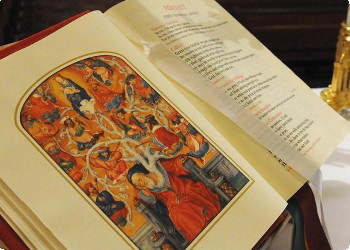Followed him on foot from their towns
Nm 11,4b-15; Ps 80; Mt 14,13-21
5 AUGUST
Jesus is the universal and not the particular pastor. He is the pastor of all, not just a few. He is the shepherd of sheep and lambs. He is the pastor of those who already believe and those who still do not believe, because they have not heard the good news. He is the shepherd on earth and in the heavens. He is the shepherd before his crucifixion and is pastor after his glorious resurrection. The whole flock of the Father is his. Every other pastor might feed his flock but only in him, with him and for him. Every separation of the shepherds from Christ is transformed into the removal of the shepherd from the sheep. Every falsehood that he introduces into Christ is a falsehood that he introduces into the flock. Every truth that discovers of Christ is a truth that he discovers of the flock. Pastors in Christ are shepherds to the flock of Christ to the extent that they allow themselves to be grazed by Christ. The more the pastor assumes the form of Christ, just as Christ assumed the form of the Father, and the more the flock takes on the form of Christ and the form of God. As Christ is from the Father for the Father and feeds the flock of the Father. Thus the shepherd is in Christ if he is from Christ for Christ and feeds the flock of Christ. Being of Christ and for Christ is an essential, constitutive and always necessary condition. Without Christ we are shepherds of death, never of life. Nobody is life for the flock. Only Christ Jesus is the way, the truth and the life of the flock.
I am the good shepherd. A good shepherd lays down his life for the sheep. A hired man, who is not a shepherd and whose sheep are not his own, sees a wolf coming and leaves the sheep and runs away, and the wolf catches and scatters them. This is because he works for pay and has no concern for the sheep. I am the good shepherd, and I know mine and mine know me, just as the Father knows me and I know the Father; and I will lay down my life for the sheep. I have other sheep that do not belong to this fold. These also I must lead, and they will hear my voice, and there will be one flock, one shepherd. This is why the Father loves me, because I lay down my life in order to take it up again. No one takes it from me, but I lay it down on my own. I have power to lay it down, and power to take it up again. This command I have received from my Father” (Jn 10,11-18).
Jesus withdrew aside with his disciples in a deserted place. The crowd follows him. Indeed it precedes him. When Jesus arrives a large crowd is before his eyes. They are his sheep. He cannot send them away. He puts himself at their service, as any good shepherd would do and teaches them many things. He opens their hearts to hope. He gives them a new light. If a pastor does not bring souls into God, he is not a good shepherd. If he takes them to himself and uses them for himself, he is a mercenary. Jesus cares for the flock of the Father and brings every sheep to the Father. This is why the Father gives them to him: so that he may remove the heart of stone from them, put the heart of the Father and then hand them over to him.
When Jesus heard of it, he withdrew in a boat to a deserted place by himself. The crowds heard of this and followed him on foot from their towns. When he disembarked and saw the vast crowd, his heart was moved with pity for them, and he cured their sick. When it was evening, the disciples approached him and said, “This is a deserted place and it is already late; dismiss the crowds so that they can go to the villages and buy food for themselves.” (Jesus) said to them, “There is no need for them to go away; give them some food yourselves.” But they said to him, “Five loaves and two fish are all we have here.” Then he said, “Bring them here to me,” and he ordered the crowds to sit down on the grass. Taking the five loaves and the two fish, and looking up to heaven, he said the blessing, broke the loaves, and gave them to the disciples, who in turn gave them to the crowds. They all ate and were satisfied, and they picked up the fragments left over – twelve wicker baskets full. Those who ate were about five thousand men, not counting women and children.
We are in a deserted place. There is no bread. The sheep are not just souls to be cured, they are also a body to be fed. Jesus gives another sign of his love. He also takes care of their body and multiplies bread for them. The Eucharist that tomorrow, before being crucified, He will give and that will have to support the sheep in the desert of their life to make the journey till reaching the eternal kingdom of God, is depicted in the multiplication of the bread. Today, in the desert of history only whoever wants to die, dies. We have the bread. However, it must be received with faith. Eating it like normal bread is of no use.
Mother of God, Angels and Saints ensure that we receive the Eucharist in fullness of truth and faith.





